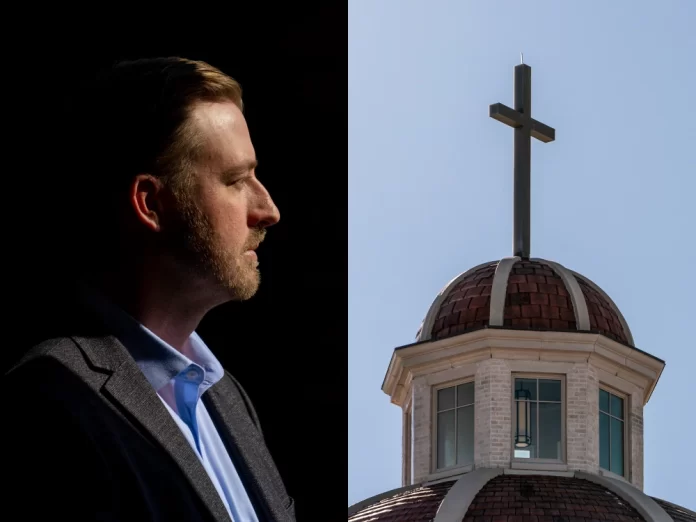A Clash Between Church and State, Oklahoma’s Religious Charter School Battle Could Reshape the First Amendment
Oklahoma is at the center of a national battle over the role of religion in public schools, and State Superintendent Ryan Walters is leading the charge. Walters, a conservative Republican and outspoken Christian, is pushing to redefine the separation of church and state by integrating religion more deeply into public education.
His efforts include approving the nation’s first religious virtual public charter school, promoting Bibles in classrooms, and incorporating Christian teachings into the curriculum. These moves have sparked legal battles that could ultimately be decided by the U.S. Supreme Court, potentially reshaping First Amendment protections on religious freedom.
The Supreme Court and the First Amendment
The controversy in Oklahoma hinges on the interpretation of the First Amendment’s two religion clauses: the establishment clause, which prevents government endorsement of religion, and the free exercise clause, which protects individuals’ rights to practice their faith.
For decades, courts have upheld a broad interpretation of the establishment clause, reinforcing Thomas Jefferson’s idea of a “wall of separation” between church and state. However, the current conservative-leaning Supreme Court has been shifting toward strengthening the free exercise clause, sometimes at the expense of the establishment clause.
If the court rules in favor of Oklahoma’s religious charter school, it could set a national precedent allowing taxpayer dollars to fund religious education in ways that were previously unconstitutional.
Opposition From Within
Despite Oklahoma’s conservative reputation—where Donald Trump won every county in the last election—Walters’ efforts have not gone unchallenged. State Attorney General Gentner Drummond, a fellow Republican, has actively fought against state-funded religious charter schools, calling it “religious indoctrination.”
“We deserve intellectual honesty on this issue,” Drummond said, warning that if the Supreme Court sides with Walters, it could open the door for other religious practices—such as school-led prayer—to return to public classrooms.
Drummond’s legal challenge led the Oklahoma Supreme Court to rule against the school proposal, but Walters and his supporters have appealed to the U.S. Supreme Court, where the conservative majority could overturn that decision.
The Push for Religious Education
The idea for a publicly funded religious school in Oklahoma gained momentum during the COVID-19 pandemic, as churches saw the potential of online education. Michael Scaperlanda, chancellor of the Archdiocese of Oklahoma City, described the moment as an opportunity to bring Catholic education to rural students using public funding.
The plan for St. Isidore of Seville Catholic Virtual School was controversial from the start. Even before its approval, legal experts anticipated challenges based on past Supreme Court rulings. But given the court’s recent decisions favoring religious rights, the archdiocese and its legal advisers saw an opening.
“Given the way the court was looking at religious liberty, it looked like an opportune time to apply,” Scaperlanda said.
A Broader Legal Trend
The Oklahoma case is just one of many recent legal battles over religion in public life.
The Supreme Court has steadily dismantled previous barriers between church and state, ruling in favor of religious rights in cases involving public funding for religious schools, a Christian football coach’s right to pray on the field, and the display of religious symbols on government property.
Now, upcoming cases could further redefine the establishment clause. One case involves a Louisiana law requiring the Ten Commandments to be displayed in public schools, while another challenges Maryland’s inclusion of LGBTQ+ books in classrooms based on religious objections.
What’s Next for Church and State?
The Supreme Court’s ruling in the Oklahoma case could signal how far it is willing to go in reinterpreting the First Amendment.
Conservative legal groups like the Alliance Defending Freedom (ADF) argue that barring religious entities from public funding is a form of discrimination. They hope to dismantle the idea that government should avoid involvement with religion altogether.
On the other side, opponents like Americans United for Separation of Church and State warn that weakening the establishment clause could lead to government-endorsed religious indoctrination.
“There is no such thing as a wall,” said ADF attorney John Bursch, dismissing Jefferson’s phrase.
Meanwhile, critics like Oklahoma minister Lori Walke see the push for religious schools as a step toward Christian nationalism, where one religious ideology is imposed through government policy.
“Christian nationalists want to replace public education with religious education,” Walke said.
As the Supreme Court weighs the Oklahoma case and other religious freedom challenges, the country’s long-standing debate over church and state is heading into uncharted territory.








